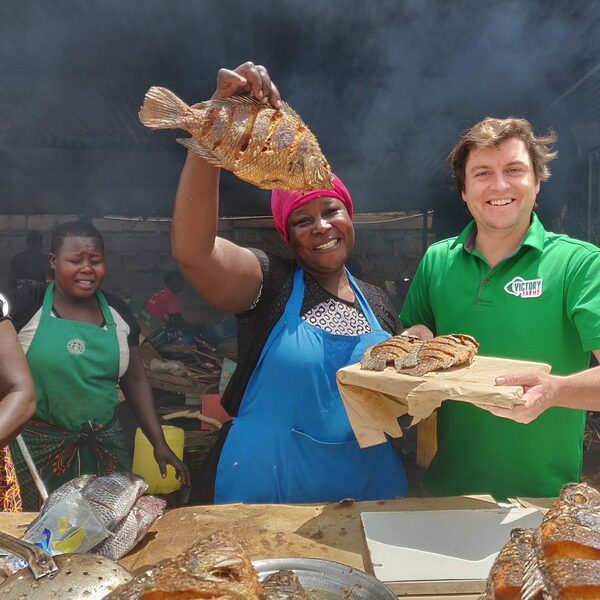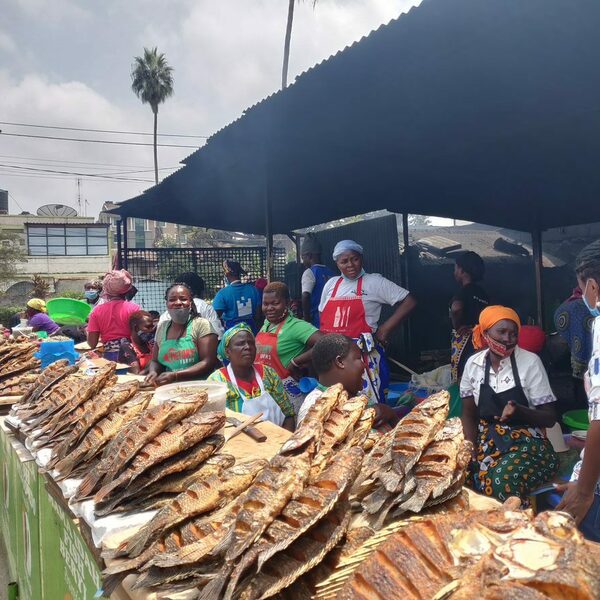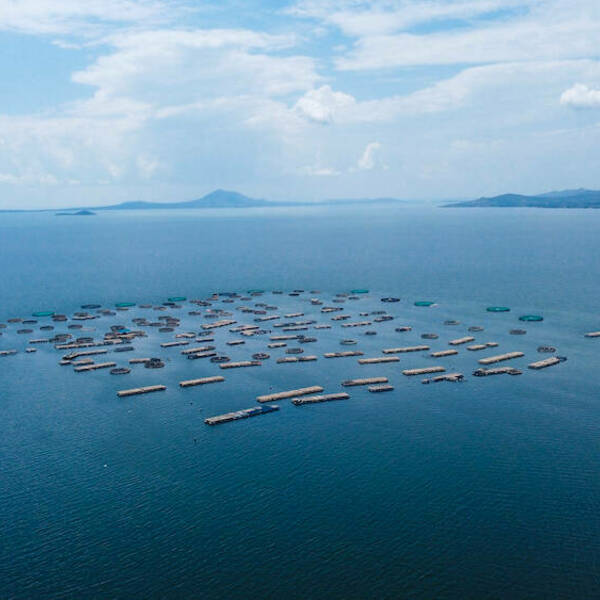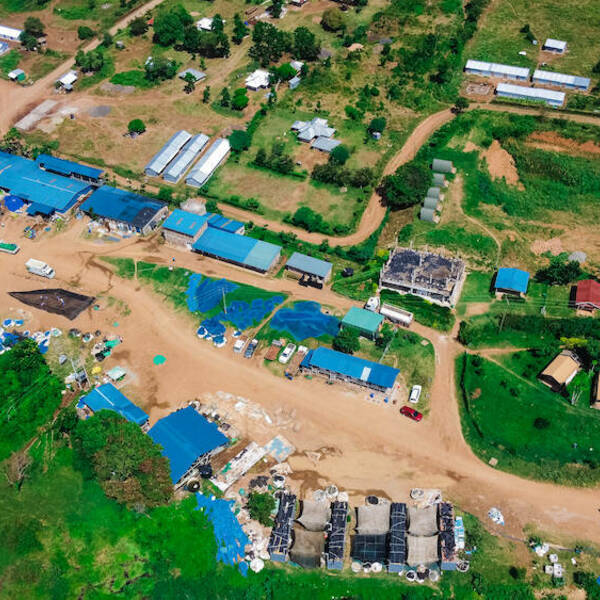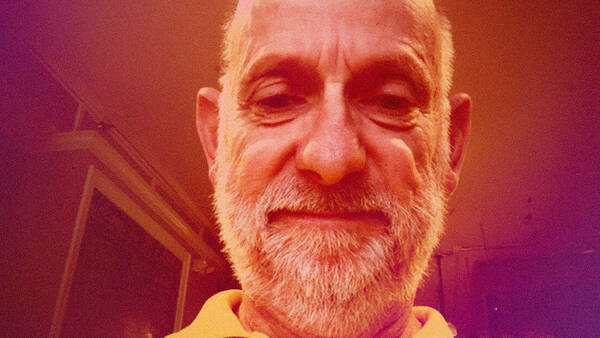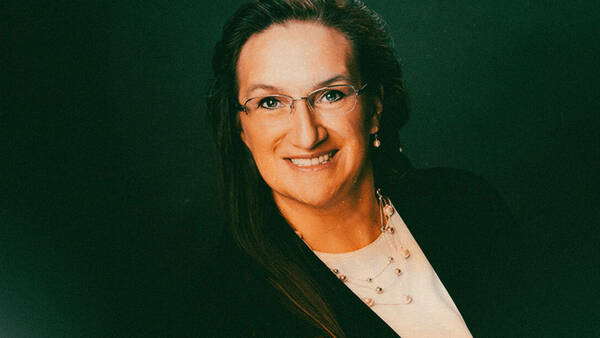As the founder and CEO of Victory Farms, Joe Rehmann '06 has ambitious goals: He wants to restore the endangered tilapia population in Africa’s Lake Victoria using sustainable aquaculture, otherwise known as fish farming.
Victory Farms uses hatcheries, nursery ponds, and deep-water cages to raise tilapia in Lake Victoria in rural Western Kenya. More fish means more affordable and nutritious protein for the local population. And the fish farm’s sustainable business practices and fish-raising methods will also help mitigate climate change.
“I went through a calculation in my head of how to have the greatest impact in my career. If we could restore the white protein diet to Africa, which is one billion people, that would have a measurable impact on the CO2 footprint of the world,” says Rehmann. “That was my motivation and it still remains, 10 years after I started working in this industry. I think we can really make a difference in the world by doing this.”
They’ve already increased the fish population enough to cut the price of tilapia in half since their founding in 2016, according to Rehmann. But there is still more work to do. The tilapia population in Lake Victoria has declined due to a combination of overfishing, pollution, invasive species predators, and climate change. At the same time, the human population has continued to increase.
“As a result, people are eating more and more hoofed animals [instead of fish],” Rehmann says. “And the savanna of East Africa is perfect for grazing animals. But as the hoofed animal population is booming to supply humans with food, the space available for nature is declining at a rapid rate. And the hoofed animal population contributes to CO2-driven climate change. So the question was, how can we play a role in mitigating or even reversing that?”
Enter Victory Farms, which he started alongside business partner Steve Moran in 2016. They both worked at Tropo Farms in Ghana, another startup fish farm, and were inspired to try the same methods in Kenya.
“Ghana was an example of what can work, but [the company] was [run by] a sole entrepreneur,” says Rehmann, who has an MBA from the international business school INSEAD (Institut Européen d'Administration des Affaires). “I came to the conclusion that the only way to build this at the scale that’s required to feed billions of people in Africa is through partnerships, platforms, and institutional relationships.”
Victory Farms fish are sold regionally at the moment, but they have plans to expand across Africa. The first step is a new fish farm in Rwanda.
To execute these major expansion plans, Rehmann and his team have raised more than $35 million from investors and venture capitalists, and have partnerships with organizations like the United States Agency for International Development (USAID) and Boston Consulting Group, as well as a university in Holland that assists with research and conservation.
The local community in Homa Bay, the rural area of Kenya where the farm is located, are also essential partners. Many of Victory Farms’ 800 employees are locals — like Lillian, who was trained as a nurse but couldn’t find employment in the field in her rural community. She started in a job gutting fish at Victory Farms, then worked her way up and learned from one of the farms’ engineers. Now she is leading the fish cage installation at the new location in Rwanda.
“The local community is supercritical. If we don’t have the support of the community, there is no way the business works,” Rehmann says. “We’ve really tried hard to build a special relationship with our community, creating development together, fixing things, and then they maintain it. We fixed up the schools and put a maternity ward in the hospital.”
The farm is about seven hours away from Nairobi, Kenya’s capital and headquarters for the Victory Farms offices. Nairobi is also home for Rehmann, his wife, and their three daughters. His work in Ghana and Kenya has been a homecoming of sorts: Rehmann was born in Africa, when his family lived in Egypt during his father’s career in the oil business.
“Africa is the cradle of humanity, and funnily enough, it’s also the cradle of tilapia. It is where tilapia first evolved. It was humans’ first food,” Rehmann says. “And I always felt a strong desire or pull to be here and have an impact here.”
He first started exploring ideas for sustainable agriculture in Africa while he was part of the Student International Business Council (SIBC) as a student at Notre Dame. The SIBC, whose motto is “peace through commerce,” is a student-run organization that provides leadership experience, business acumen, and international perspective in pursuit of business as a force for good. Some of the earliest supporters of Victory Farms were fellow alumni from the SIBC.
“In the world, there are lots of sharks, but with Notre Dame, there’s an overwhelming majority of folks who are really competent, accomplished, and have a strong sense of duty, integrity, partnership, and support that is not so common,” Rehmann says. “Notre Dame really stands out that way, in my opinion.”

